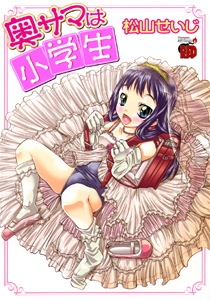
The law, which has been revised a few times and goes into effect July 1, has been met with an outcry from publishers and creators.
The publishers expressed concerns that the revised ordinance will diminish the manga creators and editors’ ability to express themselves. Some of the publishers also asked to be notified of the standards for the revised ordinance before books are sold. Mika Sakurai, the section chief in charge of youth affairs at the government’s Office for Youth Affairs and Public Safety, responded that the publishers may ask before release whether a specific publication’s setting is subject to the law. However, the government may not be able to advice the publisher on a particular publication’s legality immediately; for some publications, the government can respond quickly, but for others, the assessment may not be clear until release.
Six titles are being considered. Such as:
Oku-sama wa Shōgakusei (My Wife Is an Elementary Student)
By Seiji Matsuyama
Publisher: Akita Shoten
The story is set in the near future when the marriageable age was lowered in response to the declining birth rate. A 24-year-old man marries a 12-year-old girl in this gag comedy.
Reason for designation: Child rape
Okay then.
Rather than provide a laundry list for perverts who like this stuff, we’ll just list the rest of the titles:
Aki Sora By Masahiro Itosugi, Lovers & Sharing (Kareshi Sharing) By Yashi Natsuba, Koibito 8-gō (Lover No. 8) By Makoto Ojiro, Hanamizawa Q-taro Jisenshū Hana-Hiyori By Q-taro Hanamizawa, and Midori no Kisetsu (Blue-Green Season) By Maakō. Reasons given include incest, group rape and so on.
While most of us wouldn’t be caught dead reading a book called “My Wife Is an Elementary Student” in public, and this all sounds like common sense, material of this kind has long been fairly common in Japan, and seems to have a preventative effect, not an encouraging one, for those who like this kind of thing. The material in question is NOT hardcore ero-manga, which is already banned for sale to minors.
On the other hand, the material is just being kept from being sold to minors, which doesn’t seem like such a big deal to us Westerners.
Sankaku Complex has more, including pictures of all the rest of the dirty manga. Run right over there!




Uh – am I missing something here? If you were really a minor in Tokyo prefecture and you really were into this stuff then the government has just created a list of stuff for you that they think you might want to have a look at? “Customers who liked this title also bought …”
And then you hop the JR out to Ibaraki prefecture, buy everything on the list and be back an hour later with a satchel full of smut you wouldn’t have known existed otherwise?
It’s easy to react to the “ick” factor of “a 24-year-old man marries a 12-year-old girl”, and the book may in fact deserve that response (I don’t know), but I can imagine ways for that premise to be handled innocently enough for children (e.g. gags related to the generation gap between them, different expectations of domestic life, etc) and also ways for it to be handled as a socially worthwhile book for adults (e.g. a scathing indictment of lolicon in Japanese culture). So don’t jump to conclusions about whether this is a good thing for this book to be restricted, based just on that description.
Unfortunately most people will assume the worst, which means it will be more difficult for creators to produce those other kinds of works. The failure to distinguish between glorification of something and either mockery or criticism of it, has led to things such as Swift’s “Modest Proposal” or Twain’s “Huckleberry Finn” to be targeted for suppression.
Also, while this ban is supposedly limited to one prefecture, and only applies to sale of the books to minors, the creator of one of them has already said that she will not be reprinting the affected volumes, which means that they have (in effect) been banned thru-out Japan. The parallels here to the Comics Code are pretty strong: “common sense” restrictions on books for children, resulting in comics intended for more mature readers being unavailable too.